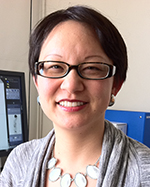November 2014

Delphine Chen, MD
Growing up in St. Louis, MO, Delphine Chen, MD, got her first exposure to patient care while helping her father in his orthodontic practice during summer breaks from school. This experience also allowed her to see firsthand how X-rays and other imaging were used, and how could they contribute to better treatment.
Today, Dr. Chen is using radiographic imaging in innovative ways to make new discoveries about lung disease as the assistant professor of radiology in the Division of Radiological Sciences and Nuclear Medicine at Mallinckrodt Institute of Radiology, and assistant professor of medicine in the Division of Pulmonary and Critical Care, Washington University School of Medicine in St. Louis.
“It is challenging to find biomarkers to determine if certain lung disease treatments or drugs are working, so this was one of the motivations for using imaging, especially molecular imaging,” Dr. Chen explains. “It’s exciting—there is so much potential for using imaging in pulmonary care.”
Using positron emission tomography (PET) tracers, Dr. Chen and colleagues are learning more about how drugs are affecting pulmonary patients. This work began with her postdoctoral fellowship with Daniel P. Schuster, MD, when they were one of the first groups to develop fluorodeoxyglucose (FDG)-PET to measure lung inflammation.
This led to Dr. Chen’s receiving a 2009 Doris Duke Charitable Foundation, through which she began focusing her efforts on researching pulmonary disease, specifically evaluating the efficacy of pioglitazone in reducing endotoxin-mediated inflammation using FDG-PET as a biomarker to determine the level of pulmonary inflammation.
Michael Holtzman, MD, director of the Division Pulmonary and Critical Care Medicine at Washington University, and Selman and Herman Seldin Professor of Medicine, has worked with Dr. Chen since 2005, researching the pathogenesis and treatment of infectious and inflammatory respiratory disease
“Delphine has been a terrific collaborator and facilitator in the field of lung imaging,” Dr. Holtzman says. “Her innovative work with PET imaging in particular has contributed to nearly every pulmonary research project at the school. She continues a great tradition of leadership in this area of research, and with her contributions, we will move even closer to being able to one day have noninvasive imaging methods that are critical to the diagnosis and therapy of respiratory diseases.”
This year, Dr. Chen received a grant for the use of PET tracers for imaging the proliferation of T cells in patients with lung transplants, which will allow her to learn which T cells are coming in to cause lung inflammation. She has also received additional grants that will fund projects to investigate which inflammation pathways are being activated.
Delphine’s innovative work with PET imaging in particular has contributed to nearly every pulmonary research project at the Washington University School of Medicine in St. Louis.—Michael Holtzman, MD
Andrew E. Gelman, PhD, associate professor of surgery, pathology and immunology at Washington University School of Medicine’s Department of Surgery, has worked with Dr. Chen since 2011.
“Delphine is a brilliant nuclear medicine physician and scientist, with a strong desire to apply our growing knowledge of the fundamental mechanisms of inflammation to better diagnose and prevent pulmonary disease,” Dr. Gelman says. “She also has boundless amount of energy and optimism for her work that is highly admired by her colleagues.”
Although Dr. Chen considered following a similar path as her father, it was biology that captured her attention. As a student at Harvard University in the early 1990s, she realized that she would find studying the body as a whole and helping people with a broader range of diseases more fulfilling.
Dr. Chen graduated with honors from Harvard-Radcliffe College in Applied Math with a focus in chemistry. Next, she returned to St. Louis where she received her medical degree from Washington University School of Medicine. Later, her research with Dr. Schuster led to her interest in continuing to develop molecular imaging techniques for pulmonary disease.
Away from all of the laboratory equipment, Dr. Chen enjoys skiing, walking her dog and learning foreign languages. In college, she studied Chinese, and today, she’s learning French with the help of another type of imaging—real-time Skype chats with a teacher in France.
Life in ATS
ATS Member Since: 2008
Primary Assembly: Respiratory Structure & Function
Secondary Assembly: Allergy Immunology & Inflammation
Committee: Membership Committee, 2013–2015
“I’m thankful that the ATS has been very receptive to this work,” says Dr. Chen, who was given the honor of delivering the ATS Young Investigator presentation at the Asian Pacific Society of Respirology 2013 Congress in Yokohama, Japan. “Through my affiliation with the ATS, I will be able to get important feedback on the right targets and applications for the tracers we are using. I hope I can continue to also put more molecular imaging ideas in front of ATS members so they can consider them.”

